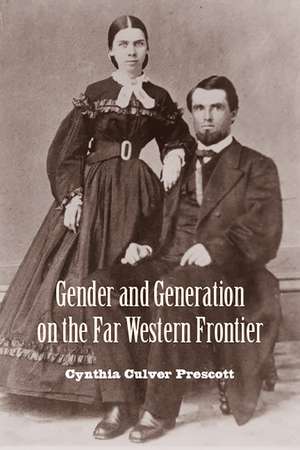Gender and Generation on the Far Western Frontier: Women's Western Voices
Autor Cynthia Culver Prescotten Limba Engleză Paperback – iun 2016
As her family traveled the Oregon Trail in 1852, Mary Ellen Todd taught herself to crack the ox whip. Though gender roles often blurred on the trail, families quickly tried to re-establish separate roles for men and women once they had staked their claims. For Mary Ellen Todd, who found a “secret joy in having the power to set things moving,” this meant trading in the ox whip for the more feminine butter churn.
In Gender and Generation on the Far Western Frontier, Cynthia Culver Prescott expertly explores the shifting gender roles and ideologies that countless Anglo-American settlers struggled with in Oregon’s Willamette Valley between 1845 and 1900. Drawing on traditional social history sources as well as divorce records, married women’s property records, period photographs, and material culture, Prescott reveals that Oregon settlers pursued a moving target of middle-class identity in the second half of the nineteenth century.
Prescott traces long-term ideological changes, arguing that favorable farming conditions enabled Oregon families to progress from accepting flexible frontier roles to participating in a national consumer culture in only one generation. As settlers’ children came of age, participation in this new culture of consumption and refined leisure became the marker of the middle class. Middle-class culture shifted from the first generation’s emphasis on genteel behavior to a newer genteel consumption.
This absorbing volume reveals the shifting boundaries of traditional women’s spheres, the complicated relationships between fathers and sons, and the second generation’s struggle to balance their parents’ ideology with a changing national sense of class consciousness.
In Gender and Generation on the Far Western Frontier, Cynthia Culver Prescott expertly explores the shifting gender roles and ideologies that countless Anglo-American settlers struggled with in Oregon’s Willamette Valley between 1845 and 1900. Drawing on traditional social history sources as well as divorce records, married women’s property records, period photographs, and material culture, Prescott reveals that Oregon settlers pursued a moving target of middle-class identity in the second half of the nineteenth century.
Prescott traces long-term ideological changes, arguing that favorable farming conditions enabled Oregon families to progress from accepting flexible frontier roles to participating in a national consumer culture in only one generation. As settlers’ children came of age, participation in this new culture of consumption and refined leisure became the marker of the middle class. Middle-class culture shifted from the first generation’s emphasis on genteel behavior to a newer genteel consumption.
This absorbing volume reveals the shifting boundaries of traditional women’s spheres, the complicated relationships between fathers and sons, and the second generation’s struggle to balance their parents’ ideology with a changing national sense of class consciousness.
Preț: 184.47 lei
Preț vechi: 231.82 lei
-20% Nou
Puncte Express: 277
Preț estimativ în valută:
35.30€ • 36.98$ • 29.25£
35.30€ • 36.98$ • 29.25£
Carte indisponibilă temporar
Doresc să fiu notificat când acest titlu va fi disponibil:
Se trimite...
Preluare comenzi: 021 569.72.76
Specificații
ISBN-13: 9780816534135
ISBN-10: 0816534136
Pagini: 232
Ilustrații: 19 halftones, 10 tables
Dimensiuni: 152 x 229 x 20 mm
Greutate: 0.31 kg
Ediția:1
Editura: University of Arizona Press
Colecția University of Arizona Press
Seria Women's Western Voices
ISBN-10: 0816534136
Pagini: 232
Ilustrații: 19 halftones, 10 tables
Dimensiuni: 152 x 229 x 20 mm
Greutate: 0.31 kg
Ediția:1
Editura: University of Arizona Press
Colecția University of Arizona Press
Seria Women's Western Voices
Notă biografică
Cynthia Culver Prescott is a teaching fellow in American Cultures Studies at Loyola Marymount University in Los Angeles, California, where she teaches courses on work, gender, and ethnicity in the American West.
Cuprins
List of Illustrations
Acknowledgments
Introduction
1 Fashioning Women and Men on the Frontier
2 Masculine Providers and Manly Men
3 Love, Power, and Marital Choice
4 Refining the Domestic Sphere
5 New Roles for ‘‘New Women’’
6 Remembering and Reinventing Oregon Pioneers
Conclusion
Abbreviations
Notes
Selected Bibliography
Index
Acknowledgments
Introduction
1 Fashioning Women and Men on the Frontier
2 Masculine Providers and Manly Men
3 Love, Power, and Marital Choice
4 Refining the Domestic Sphere
5 New Roles for ‘‘New Women’’
6 Remembering and Reinventing Oregon Pioneers
Conclusion
Abbreviations
Notes
Selected Bibliography
Index
Recenzii
“An exceptionally good work. It is concise, well-written, and cogently argued.”—Southern California Quarterly
“This useful study fills a glaring gap in our knowledge of western women.”—New Mexico Historical Review
“Prescott’s work begins to fill gaps in both Western and Gender history and should provide a starting point for further research and scholarship on the impact of generational shifts to gender roles in the West.”—Southwestern Historical Quarterly
“This useful study fills a glaring gap in our knowledge of western women.”—New Mexico Historical Review
“Prescott’s work begins to fill gaps in both Western and Gender history and should provide a starting point for further research and scholarship on the impact of generational shifts to gender roles in the West.”—Southwestern Historical Quarterly

